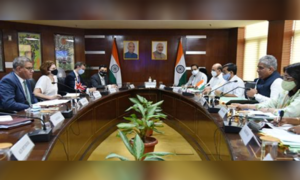A new World Bank technical support programme is seeking to accelerate development of more sustainable cooling solutions in developing countries, as well as tackling policy and finance barriers.
The focus, which has been launched during a two-day ‘Clean Cooling’ congress in London that started on April 24, aims to ensure that the bank’s investment projects look at supporting a more holistic approach to efficient cooling.
Alongside an anticipated surge in cooling demand around the world, particular concern has been raised about the potential environmental impacts of refrigeration and air conditioning needs in countries such as China, India, Brazil and Indonesia. The World Bank added that predictions of a fivefold increase in cooling technologies in many of these countries up to 2050 will put further pressure on already strained energy systems.
The Clean Cooling Programme launched by the bank has been supported by a $3 million grant from the Kigali Cooling Efficiency Program (K-CEP) to focus on where market infrastructure and financial support may be insufficient to introduce lower carbon cooling systems.
An additional focus on new policies and regulations to support wider scale adoption of sustainable cooling through air conditioning, refrigeration and the cold chain will also be focused on, according to the World Bank.
Collaboration between public and private sector organisations will be part of the programme’s focus to look at both mechanical and non-mechanical solutions that can mitigate the impacts of higher temperatures through both design and technological approaches.
Rohit Khanna, Manager of the World Bank’s Energy Sector Management Assistance Programme, said that the concept of sustainable cooling was a fundamental part of efforts to transition to a lower carbon economy and infrastructure.
He said, “Meeting the growing demand for cooling services without compromising climate change goals will require substantial investments in energy efficient cooling solutions that are affordable and accessible to developing countries.”
The programme is intended to build on the World Bank’s expertise in transport, energy, agriculture and urban development projects to look at new cooling approaches that can potentially be financed and then scaled-up.
Cookie Consent
We use cookies to personalize your experience. By continuing to visit this website you agree to our Terms & Conditions, Privacy Policy and Cookie Policy.



![12 [2]](https://www.thermalcontrolmagazine.com/wp-content/uploads/2021/08/12-2-300x180.jpg)
![12 [1]](https://www.thermalcontrolmagazine.com/wp-content/uploads/2021/08/12-1-300x180.jpg)









